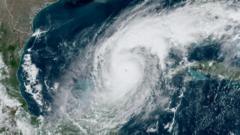Nepal's acceptance of a $500 million U.S. grant for infrastructure projects raises doubts among leaders as the Trump administration freezes foreign aid, potentially benefiting China.
Nepal Questions U.S. Aid After Trump Administration's Foreign Aid Freeze

Nepal Questions U.S. Aid After Trump Administration's Foreign Aid Freeze
Concerns arise in Nepal as China's influence grows amid U.S. aid suspension.
Nepal, a small Himalayan country adjacent to China, found itself in a precarious position after accepting a substantial offer from the United States for infrastructure development. After extensive negotiations with Beijing, the U.S. government pledged $500 million in grants to support the improvement of Nepal's electricity grid and road infrastructure over five years—a considerable investment for a nation where the average annual income hovers around $1,400. Despite vocal opposition claiming that the Nepali government was succumbing to U.S. influence, officials ratified the agreement in 2022, contributing $200 million from their own budget as part of the deal.
However, the political landscape shifted dramatically with the Trump administration's recent freeze on foreign aid, leaving the future of this project uncertain. Lawmaker Rajendra Bajgain of the governing Nepali Congress expressed shock and concern over the sudden withdrawal of American support, implying that this move could severely weaken Nepal's negotiating posture against an increasingly powerful China. He remarked, “This is quite shocking... They will come to our office and say, ‘See, this is how America acts.’”
As doubts grow over the U.S.'s reliability as a partner, it remains unclear whether China is actively seeking to exploit this newfound vulnerability. Still, Nepal’s situation illustrates the broader implications of the Trump administration's foreign policy, which critics argue has strained relationships with traditional allies and increased the potential for Chinese expansionism in the region. India, Nepal's neighbor and a key player in South Asian geopolitics, may find it more challenging to counter Chinese advancement without dependable U.S. backing in the future.
However, the political landscape shifted dramatically with the Trump administration's recent freeze on foreign aid, leaving the future of this project uncertain. Lawmaker Rajendra Bajgain of the governing Nepali Congress expressed shock and concern over the sudden withdrawal of American support, implying that this move could severely weaken Nepal's negotiating posture against an increasingly powerful China. He remarked, “This is quite shocking... They will come to our office and say, ‘See, this is how America acts.’”
As doubts grow over the U.S.'s reliability as a partner, it remains unclear whether China is actively seeking to exploit this newfound vulnerability. Still, Nepal’s situation illustrates the broader implications of the Trump administration's foreign policy, which critics argue has strained relationships with traditional allies and increased the potential for Chinese expansionism in the region. India, Nepal's neighbor and a key player in South Asian geopolitics, may find it more challenging to counter Chinese advancement without dependable U.S. backing in the future.




















